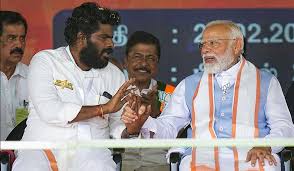 In a significant development in Tamil Nadu’s political landscape, the Bharatiya Janata Party (BJP) has managed to increase its vote share to double digits in the 2024 Lok Sabha elections, despite not winning any seats. This election marked the first time the BJP contested without an alliance with the Dravidian giants, the DMK or AIADMK, relying instead on smaller regional allies.
In a significant development in Tamil Nadu’s political landscape, the Bharatiya Janata Party (BJP) has managed to increase its vote share to double digits in the 2024 Lok Sabha elections, despite not winning any seats. This election marked the first time the BJP contested without an alliance with the Dravidian giants, the DMK or AIADMK, relying instead on smaller regional allies.After breaking ties with the AIADMK, which it partnered with in the 2019 Lok Sabha and 2021 State Assembly elections, the BJP formed the National Democratic Alliance (NDA) in Tamil Nadu with the Pattali Makkal Katchi (PMK), Tamil Maanila Congress (Moopanar), Amma Makkal Munnetra Kazhagam (AMMK), and other smaller parties.
According to data from the Election Commission of India, the BJP, contesting in 23 Lok Sabha constituencies, secured nearly 11.1% of the votes in the state. This performance marked a significant increase from the 3.6% vote share in the 2019 general election, where the party contested in just five constituencies. Although none of their candidates emerged victorious, the BJP managed to perform slightly better than the Congress, which secured 10.78% of the vote in nine constituencies as part of the INDIA bloc.
BJP State president K. Annamalai, who contested from Coimbatore, lost in a three-cornered race, surpassing Singai G. Ramachandran of the AIADMK but falling short of DMK’s Ganapathi P. Rajkumar. Other notable BJP figures who, despite their defeats, secured the second position included Union Minister L. Murugan in Nilgiris (SC), former Telangana Governor Tamilisai Soundararajan in Chennai South, BJP Legislature Party leader Nainar Nagenthran in Tirunelveli, and former Union Minister Pon. Radhakrishnan in Kanniyakumari. Additionally, A.C. Shanmugham of the BJP ally Puthiya Neethi Katchi secured the second spot in Vellore.
Several other NDA candidates also managed to secure the second spot in their constituencies. These included Vinoj P. Selvam in Chennai Central, Raama Sreenivasan in Madurai, Pon. V. Balaganapathy in Thiruvallur (SC), O. Panneerselvam in Ramanathapuram, and T.T.V. Dhinakaran in Theni. However, only Sowmiya Anbumani of the PMK gave the alliance a glimmer of hope, leading in the initial rounds of counting before ultimately losing by nearly 20,000 votes.
The TMC(M), led by G.K. Vasan, contested in Sriperumbudur, Erode, and Thoothukudi as part of the NDA but failed to secure even the second position in these constituencies.
Despite the lack of electoral victories, the BJP’s increased vote share and strong second-place finishes in several key constituencies indicate a growing influence in Tamil Nadu. This performance suggests a potential shift in the state’s political dynamics, where the BJP, traditionally struggling to gain a foothold, might become a more significant player in future elections. The results reflect the party’s strategic adjustments and the leadership of K. Annamalai, who remains optimistic about the BJP’s prospects in Tamil Nadu.

